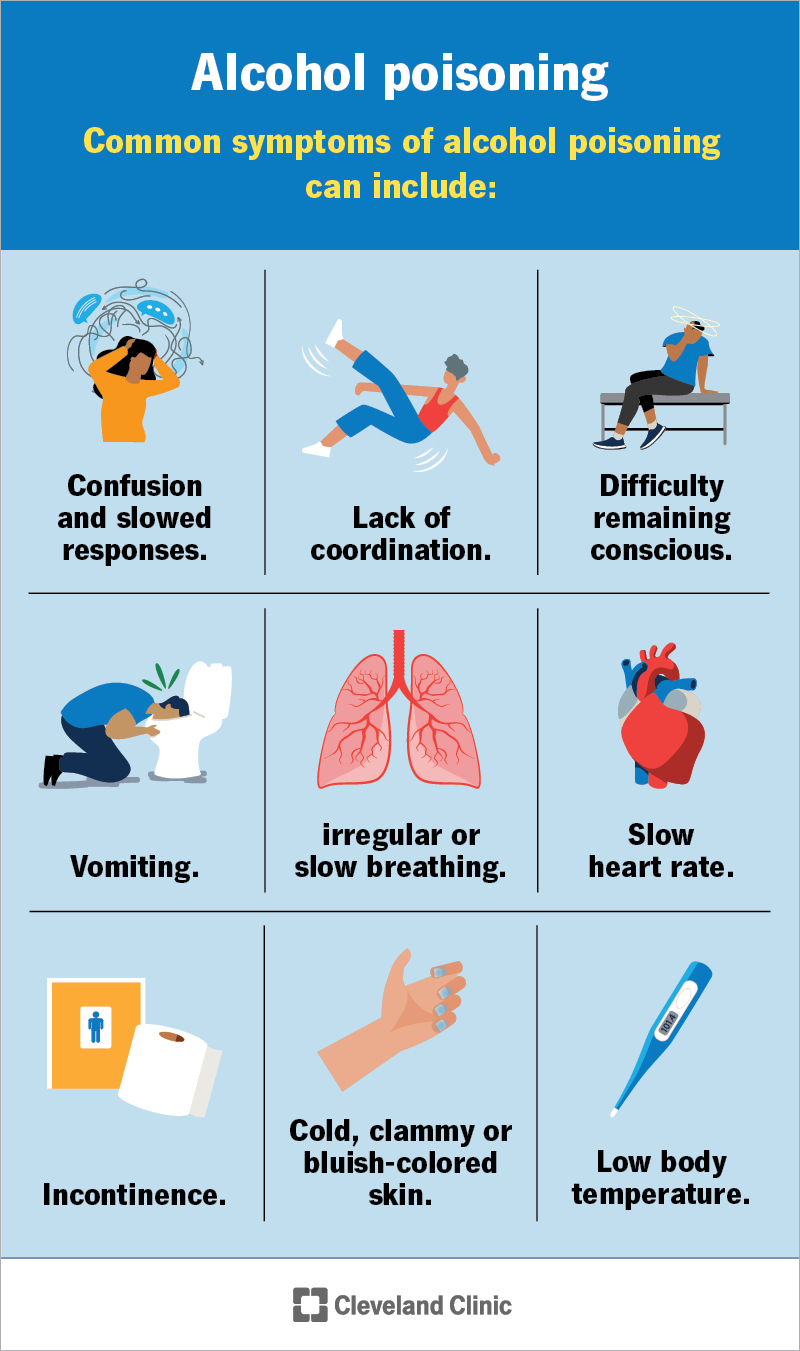Alcohol poisoning happens when excess alcohol in your bloodstream starts affecting life-supporting functions, like your breathing, heart rate and consciousness. Alcohol poisoning can be life-threatening and needs immediate medical care.
Alcohol poisoning happens when there’s so much alcohol in your bloodstream that it starts shutting down life-supporting areas of your brain. These areas control your breathing, heart rate and temperature. Alcohol poisoning is life-threatening.
Alcohol poisoning typically happens when you consume a large amount of alcohol in a short amount of time. It often happens from drinking excess alcohol-containing beverages, like beer, wine and/or liquor. But it can also occur due to non-beverage alcohol (ethanol), which is in things like mouthwash, cologne and cough medicine.
If you think someone has alcohol poisoning, get them medical help as soon as possible.
Other names for alcohol poisoning include alcohol overdose and ethanol toxicity.
Advertisement
Cleveland Clinic is a non-profit academic medical center. Advertising on our site helps support our mission. We do not endorse non-Cleveland Clinic products or services. Policy

Common symptoms of alcohol poisoning include:
The person may also smell strongly of alcohol.
If someone near you has these symptoms, call 911 (or your local emergency services number) or take them to the nearest emergency room. Alcohol poisoning can be fatal.
You can do several things to help someone who shows signs of alcohol poisoning:
When paramedics arrive, be ready to tell them what you can about the person. You might need to describe how much they drank or what they’ve been doing since you called.
As your body digests and absorbs alcohol, the alcohol enters your bloodstream. Your blood alcohol content (BAC) begins to rise. Your liver breaks down alcohol to remove it from your body because it’s a toxin. But when BAC levels are high, your liver can’t remove the toxins quickly enough.
The extra alcohol in your bloodstream acts as a depressant. This means that it slows down your body’s normal functions. If you continue to drink (and drink quickly), your BAC continues to rise. The depressant effect becomes more and more intense.
If the depressant effects begin affecting key functions of your body, like your breathing and consciousness, it’s considered alcohol poisoning. Every person is different, so there’s no way to know how much you can drink before you’re at risk of alcohol poisoning. That’s why you should always drink in moderation and slowly.
Here’s how different percentages of BAC can affect you physically and mentally:
Alcohol poisoning can affect anyone. But several factors can increase your risk, including:
Advertisement
Healthcare providers mainly diagnose alcohol poisoning based on the following:
Because alcohol poisoning can be a medical emergency, they typically order several tests to check your overall health. These may include:
If someone has alcohol poisoning, they may need lifesaving treatment right away. In a medical setting, healthcare professionals will use:
A person with alcohol poisoning needs medical help in a hospital. You shouldn’t try to treat it at home or “sleep it off.” A major danger of alcohol poisoning is choking on your vomit, which can happen when you’re unconscious or sleeping. This can cause death.
Advertisement
To prevent alcohol poisoning, limit your alcohol consumption. If you or a friend are drinking, pay attention to how much you consume and how quickly. If a friend appears to be drinking too much too fast, try to intervene and limit how much more they have. Moderation is always important. Drink no more than one alcohol-containing beverage an hour.
Each of the following examples of those forms is equal to one drink.
| Beer | Malt Liquor | Wine | Liquor (Bourbon, Gin, Rum, Tequila, Vodka, Whiskey) |
|---|---|---|---|
| 5% alcohol by volume (ABV) | 7% ABV | 12% ABV | 40% ABV |
| 12 fluid ounces | 8 to 9 fluid ounces | 5 fluid ounces | 1.5 fluid ounces |
| Beer | |||
| 5% alcohol by volume (ABV) | |||
| Malt Liquor | |||
| 7% ABV | |||
| Wine | |||
| 12% ABV | |||
| Liquor (Bourbon, Gin, Rum, Tequila, Vodka, Whiskey) | |||
| 40% ABV | |||
| 12 fluid ounces | |||
| Malt Liquor | |||
| 8 to 9 fluid ounces | |||
| Wine | |||
| 5 fluid ounces | |||
| Liquor (Bourbon, Gin, Rum, Tequila, Vodka, Whiskey) | |||
| 1.5 fluid ounces |
Additionally, you can prevent alcohol poisoning by:
If you think you or someone else may have issues with alcohol or alcohol use disorder, reach out for help. Talk to your healthcare provider or call the Substance Abuse and Mental Health Services Administration (SAMHSA) at 1-800-662-HELP (4357). Someone will be available to help.
The prognosis (outlook) for alcohol poisoning depends on many factors, including:
People who don’t have any major complications from alcohol poisoning typically have a good prognosis.
Alcohol poisoning is serious. Someone who has too much alcohol to the point of an overdose can have the following complications:
People with alcohol poisoning are also more likely to experience injuries, which can be severe.
A note from Cleveland Clinic
Alcohol poisoning is serious and potentially life-threatening. If you think someone has it, get them medical help as soon as possible. If you think you might have a problem with alcohol, call SAMHSA or talk to your healthcare provider. They’re available to help and support you.
Last reviewed on 01/26/2024.
Learn more about the Health Library and our editorial process.
Advertisement
Cleveland Clinic is a non-profit academic medical center. Advertising on our site helps support our mission. We do not endorse non-Cleveland Clinic products or services. Policy